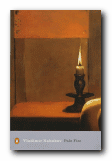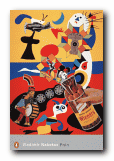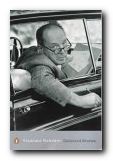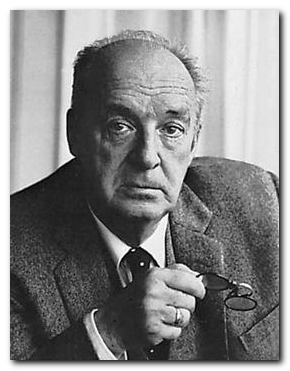tutorial, commentary, further reading, plot, and web links
Scenes from the Life of a Double Monster was written in English and first published in The Reporter in 1950. The story then appeared in the single volume collection of Nabokov’s short stories Nabokov’s Dozen (1958).
Vladimir Nabokov
Critical commentary
The term ‘scenes’ in the title should alert readers to the fact that it is not a short story in the conventional sense, but a sketch or the unfinished germ of an idea. Having set up the conceit of a narrative told from the point of view of a conjoined twin, Nabokov does not seem to have known what to do with it. Not only is there no development or elaboration in the point of view, but the chain of events simply comes to an abrupt halt when the two boys are captured by their uncle. The only sense of closure to the narrative is the grim revelation that the brothers remain captives twenty years later.
It is interesting to note that in contrast to all that is known about the telepathic levels of communication that normally exists between twins, Nabokov completely excludes the second brother Lloyd from the narrative. Indeed Floyd’s consciousness is rigorously individualistic, and he even observed that the two brothers do not speak to each other. He distances himself from Lloyd, observing of their dead parent the ‘bliss’ he feels in calling her ‘my mother’. And he mentions a propos their miserable childhood that Lloyd ‘forgot much when he grew up. I have forgotten nothing’.
The story is a typically Nabokovian mixture of pathos and the grotesque, but the Black Sea setting remains quite unconvincing.
Study resources
![]() The Cambridge Companion to Nabokov – Amazon UK
The Cambridge Companion to Nabokov – Amazon UK
![]() Zembla – the official Vladimir Nabokov web site
Zembla – the official Vladimir Nabokov web site
![]() The Paris Review – 1967 interview, with jokes and put-downs
The Paris Review – 1967 interview, with jokes and put-downs
![]() First editions in English – Bob Nelson’s collection of photographs
First editions in English – Bob Nelson’s collection of photographs
![]() Vladimir Nabokov at Wikipedia – biographical notes, links
Vladimir Nabokov at Wikipedia – biographical notes, links
![]() Vladimir Nabokov at Mantex – tutorials, web links, study materials
Vladimir Nabokov at Mantex – tutorials, web links, study materials
![]() Brian Boyd, Vladimir Nabokov: The Russian Years, Princeton University Press, 1990.
Brian Boyd, Vladimir Nabokov: The Russian Years, Princeton University Press, 1990.
![]() Brian Boyd, Vladimir Nabokov: The American Years, Princeton University Press, 1991.
Brian Boyd, Vladimir Nabokov: The American Years, Princeton University Press, 1991.
![]() Laurie Clancy, The Novels of Vladimir Nabokov. New York: St. Martin’s Press, 1984.
Laurie Clancy, The Novels of Vladimir Nabokov. New York: St. Martin’s Press, 1984.
![]() Neil Cornwell, Vladimir Nabokov: Writers and their Work, Northcote House, 2008.
Neil Cornwell, Vladimir Nabokov: Writers and their Work, Northcote House, 2008.
![]() Jane Grayson, Vladimir Nabokov: An Illustrated Life, Overlook Press, 2005.
Jane Grayson, Vladimir Nabokov: An Illustrated Life, Overlook Press, 2005.
![]() Norman Page, Vladimir Nabokov: Critical Heritage, London: Routledge, 1997
Norman Page, Vladimir Nabokov: Critical Heritage, London: Routledge, 1997
![]() David Rampton, Vladimir Nabokov: A Critical Study of the Novels. New York: Cambridge University Press, 1984.
David Rampton, Vladimir Nabokov: A Critical Study of the Novels. New York: Cambridge University Press, 1984.
![]() Michael Wood, The Magician’s Doubts: Nabokov and the Risks of Fiction. Princeton, New Jersey: Princeton University Press, 1995.
Michael Wood, The Magician’s Doubts: Nabokov and the Risks of Fiction. Princeton, New Jersey: Princeton University Press, 1995.
Plot summary
The story is narrated in the first person by Floyd, one of conjoined twin brothers who are born as a result of their mother being raped. Following her death in childbirth, they grow up on a remote farm somewhere near the Black Sea which is owned by their villainous grandfather.
As children, local villagers are allowed to regard them as a circus-like curiosities, and the grandfather quickly realises he can make money from exhibiting them as such. Floyd naively wonders (exclusively on his own behalf) if normal ‘single’ children have any advantages in life, whilst he and his twin Lloyd are forced into humiliating proximity with each other
The twins grow to the age of twelve, at which point their wellbeing is threatened by another relative – a newly arrived uncle. Floyd dreams of being separated from his brother and escaping to freedom, and when the uncle threatens to tour them as a freak show spectacle, they escape from the farm and head to the nearby seashore. However, the uncle is waiting for them when they arrive. He abducts them, and for the next twenty years they are in his power. It is from this point, at the age of thirty-two, that the story is related.
Other work by Vladimir Nabokov
 Pale Fire is a very clever artistic joke. It’s a book in two parts – the first a long poem (quite readable) written by an American poet who we are encouraged to think of as someone like Robert Frost. The second half is a series of footnoted commentaries on the text written by his neighbour, friend, and editor. But as we read on the explanation begins to take over the poem itself, we begin to doubt the reliability – and ultimately the sanity – of the editor, and we end up suspended in a nether-world, half way between life and illusion. It’s a brilliantly funny parody of the scholarly ‘method’ – written around the same time that Nabokov was himself writing an extensive commentary to his translation of Pushkin’s Eugene Onegin.
Pale Fire is a very clever artistic joke. It’s a book in two parts – the first a long poem (quite readable) written by an American poet who we are encouraged to think of as someone like Robert Frost. The second half is a series of footnoted commentaries on the text written by his neighbour, friend, and editor. But as we read on the explanation begins to take over the poem itself, we begin to doubt the reliability – and ultimately the sanity – of the editor, and we end up suspended in a nether-world, half way between life and illusion. It’s a brilliantly funny parody of the scholarly ‘method’ – written around the same time that Nabokov was himself writing an extensive commentary to his translation of Pushkin’s Eugene Onegin.
![]() Buy the book at Amazon UK
Buy the book at Amazon UK
![]() Buy the book at Amazon US
Buy the book at Amazon US
 Pnin is one of his most popular short novels. It deals with the culture clash and catalogue of misunderstandings which occur when a Russian professor of literature arrives on an American university campus. Like many of Nabokov’s novels, the subject matter mirrors his life – but without ever descending into cheap autobiography. This is a witty and tender account of one form of naivete trying to come to terms with another. This particular novel has always been very popular with the general reading public – probably because it does not contain any of the dark and often gruesome humour that pervades much of Nabokov’s other work.
Pnin is one of his most popular short novels. It deals with the culture clash and catalogue of misunderstandings which occur when a Russian professor of literature arrives on an American university campus. Like many of Nabokov’s novels, the subject matter mirrors his life – but without ever descending into cheap autobiography. This is a witty and tender account of one form of naivete trying to come to terms with another. This particular novel has always been very popular with the general reading public – probably because it does not contain any of the dark and often gruesome humour that pervades much of Nabokov’s other work.
![]() Buy the book at Amazon UK
Buy the book at Amazon UK
![]() Buy the book at Amazon US
Buy the book at Amazon US
 Collected Stories Nabokov is also a master of the short story form, and like many writers he tried some of his literary experiments there first, before giving them wider reign in his novels. This collection of sixty-five complete stories is drawn from his entire working life. They range from the early meditations on love, loss, and memory, through to the later technical experiments, with unreliable story-tellers and the games of literary hide-and-seek. All of them are characterised by a stunning command of language, rich imagery, and a powerful lyrical inventiveness.
Collected Stories Nabokov is also a master of the short story form, and like many writers he tried some of his literary experiments there first, before giving them wider reign in his novels. This collection of sixty-five complete stories is drawn from his entire working life. They range from the early meditations on love, loss, and memory, through to the later technical experiments, with unreliable story-tellers and the games of literary hide-and-seek. All of them are characterised by a stunning command of language, rich imagery, and a powerful lyrical inventiveness.
![]() Buy the book at Amazon UK
Buy the book at Amazon UK
![]() Buy the book at Amazon US
Buy the book at Amazon US
© Roy Johnson 2014
More on Vladimir Nabokov
More on literary studies
Nabokov’s Complete Short Stories
